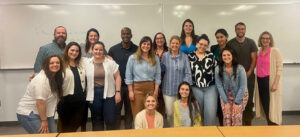Olivia Barrows, impact and operations senior specialist at B:CIVIC, completed the Certificate in ESG Strategy at CU Boulder Leeds School of Business in spring 2023. Read her reflection on the experience below.
My undergraduate science credit was a course on climate change, complete with videos of emaciated polar bears and projections of Florida underwater. It was an informative—yet anxiety-producing—class that didn’t necessarily equip me to take climate action. It was difficult as a young person to learn about this reality but only be offered solutions in the form of recycling cans and riding a bike.
I’ve also been privileged to live in areas that haven’t yet been impacted by the worst effects of climate change. Or at least while growing up my community didn’t make the connection between increased wildfires, a shallow Colorado River and greenhouse gas emissions.
Going through the Certificate in ESG Strategy (CESG), formerly Certification in CSR, was a very different experience from my undergraduate course. Every component of ESG—environmental, social and governance—brings real challenges: the rapidly approaching climate tipping point, rising inequality, the proliferation of artificial intelligence. And each of those certainly provoke anxiety and fill our newsfeeds daily. But throughout the CESG program, these challenges were discussed largely in terms of solutions.

Every session was grounded in real-life work with best practices from CSR—corporate social responsibility—and ESG professionals at companies like Hello Fresh, Ball Corporation, LinkedIn and Newmont Corporation. With my academic background in international studies, I found it interesting to hear from the team at PopSockets working on supply chains because they utilize diplomacy and education to change behavior and meet a collective emissions goal.
ESG as a term and practice comes from the financial sector, and so we spent a session learning about investing with Green Alpha Advisors. This session came the same week as the Intergovernmental Panel on Climate Change (IPCC)’s report, Climate Change 2023: Synthesis Report—hello, undergraduate climate anxiety! The report uses phrases like “the climate time-bomb” to describe the urgency of our situation. But it also states that we have the solutions needed to reduce carbon emissions and adapt to a changing climate—if we rapidly scale them. Green Alpha Advisors intentionally invests in such innovations and demonstrates that there’s profit to be made while supporting the planet.
Environmental sustainability isn’t the only component of an ESG strategy, and I appreciated that the course explored DEI—diversity, equity and inclusion—at the outset and used it as a frame within every conversation. Solutions that touch the E, S and G are only effective if they are equitable.
I was recently at the Cities Summit of the Americas where someone shared Gloria Steinem’s quote, “Hope is a form of planning.” I think that’s what was missing in my undergraduate climate course. I wonder if we can think of ESG strategy as a meld of hope and planning?
For those interested in learning about ESG, CSR or DEI, the Certification in ESG Strategy provides tangible examples to empower leaders in any role to take action.
At B:CIVIC our mission is to elevate business for good, and we are proud to have collaborated with our investors to help develop and found this course in partnership with CSER at the University of Colorado Leeds School of Business. Whether you’re in an active role doing this work already or just curious to learn more, this course has a place for everyone. Learn more here.
